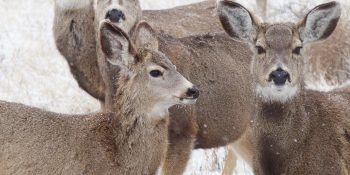DENVER – At its virtual meeting today, the Colorado Parks and Wildlife Commission discussed the results from CPW’s mandatory Chronic Wasting Disease (CWD) testing in 2019. CPW Terrestrial Programs Supervisor Matthew Eckert and State Wildlife Veterinarian Dr. Mary Wood provided an update to the Commission on the testing efforts.
As of February 2020, CWD has been detected in 33 of 54 deer herds, 14 of 43 elk herds, and 2 of 9 moose herds. The percentage of sampled animals infected (or “prevalence”) appears to be rising in many affected Colorado herds.
In the early 2000s, hunters were very interested in learning whether their deer or elk was CWD positive. Results from large numbers of voluntary submissions showed most herds were low-prevalence or CWD was undetected. Thereafter, voluntary submissions sharply declined. By 2010, trends in prevalence became difficult to track because too few hunters voluntarily submitted samples for testing. As a result, prevalence estimates for most herds were unreliable. However, even with small submission numbers, a high proportion of animals tested positive in some herds, which indicated that prevalence had likely increased. In 2017, CPW resumed mandatory submissions from hunter-harvested deer to boost sample sizes and develop a clear understanding of how CWD trends had changed.
The expanded testing is part of CPW’s Colorado Chronic Wasting Disease Response Plan, a 15-year plan that will use rotating mandatory tests on hunter-harvested deer to give a complete picture of Colorado’s CWD prevalence every five years. The plan also provides a suite of tactics that CPW wildlife managers can implement to lower CWD prevalence in GMUs with a prevalence of 5% or greater for adult bucks.
In 2019, CPW required mandatory testing for rifle season deer hunters in 79 GMUs, mostly located in eastern Colorado. The expanded testing gave wildlife managers the clearest picture yet of CWD prevalence in Colorado.
Testing in 2019 • 16 deer herds were included in mandatory testing
- Over 7,700 samples tested statewide for all cervid species
- CWD prevalence exceeds the 5% management threshold in 18 deer herds
- Data collected from mandatory testing shows CWD prevalence is higher in male deer than female deer
- Prevalence may be slightly higher in mule deer than in white-tailed deer
- 5 herds have prevalence between 5-10%, 7 herds have prevalence between 10-20%, and 6 herds have prevalence that exceeds 20%. When prevalence is 20%, it means 1 out of 5 adult males are infected Management of CWD
CPW is working to minimize the number of animals that die from this disease. To date, management actions have been taken in 18 deer herds that intend to reduce prevalence to below 5%. Generally, actions include an increase in licenses to reduce the density of a herd, particularly in CWD hot spots, which should reduce transmission. In addition, because male deer are more prone to have CWD than female deer, actions also include the increase of antlered deer licenses to reduce the herd’s sex ratio. Both approaches have sideboards, meaning the population or sex ratio can be reduced to no lower than the management objective ranges in respective herd management plans, which have already been approved by the public and the Parks and Wildlife Commission.
CWD testing in 2020
The 2020 Colorado Big Game Brochure is out and 89 GMUs are included for mandatory CWD testing in 2020 (see page 21), mostly in western Colorado. If a rifle season deer hunter harvests (either sex) in these units in 2020, they will need to bring their head in to a CWD submission location so CPW technicians can collect a lymph node sample for testing.
About CWD
CWD is a prion disease that affects members of the deer family, such as mule deer, white-tailed deer, elk and moose. The disease is always fatal and infected animals can develop symptoms like weight loss, stumbling and listlessness.
Although there has been no evidence that CWD has been transmitted to humans, the Center for Disease Control, along with the Colorado Department of Public Health and Environment, recommend that hunters not eat the meat of a CWD-infected animal.
More information about CWD is available on CPW’s website.
More information on prion diseases is available on CDPHE’s website.
SPREAD THE NEWS
COMMENT, Like, Follow & SHARE @I70Scout
CURRENT EDITION
WEATHER & TRAFFIC PUZZLES RECENT NEWS ADVERTISE WITH US

Leave a Reply